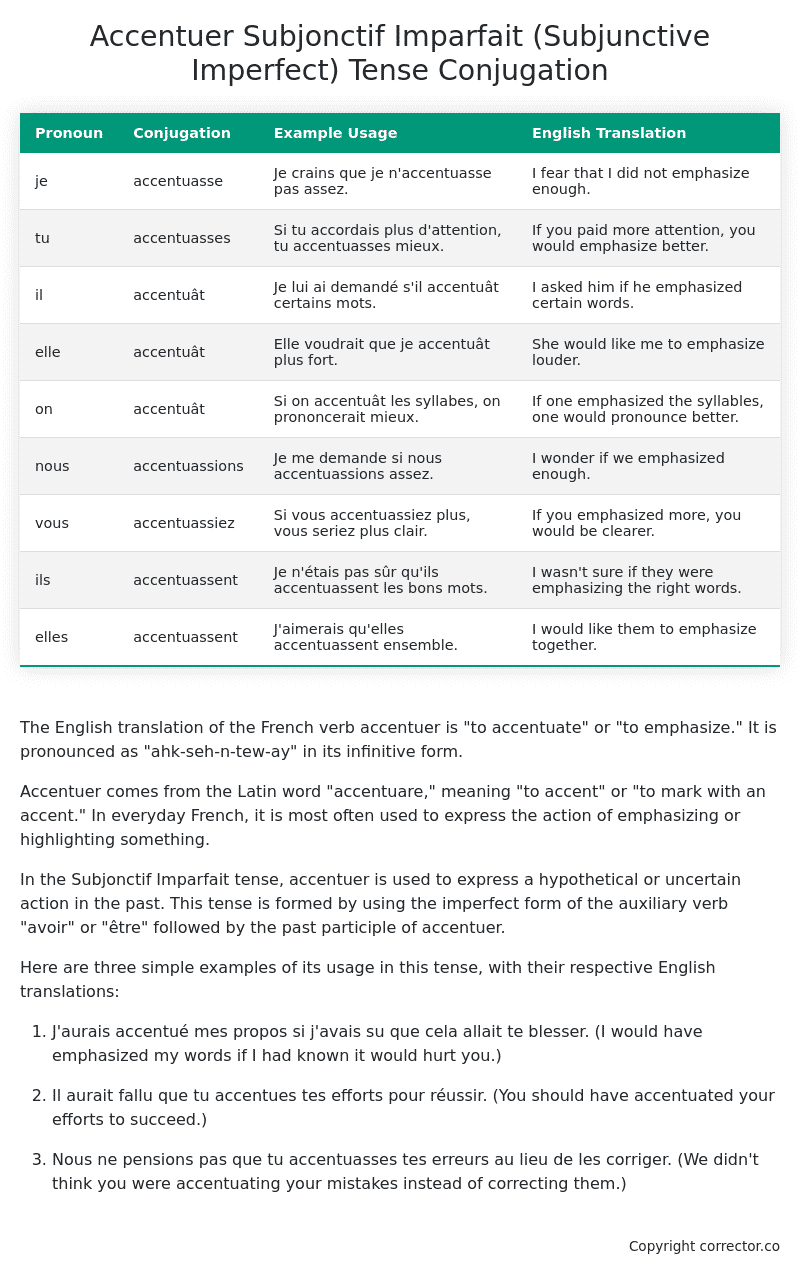Subjonctif Imparfait (Subjunctive Imperfect) Tense Conjugation of the French Verb accentuer
Introduction to the verb accentuer
The English translation of the French verb accentuer is “to accentuate” or “to emphasize.” It is pronounced as “ahk-seh-n-tew-ay” in its infinitive form.
Accentuer comes from the Latin word “accentuare,” meaning “to accent” or “to mark with an accent.” In everyday French, it is most often used to express the action of emphasizing or highlighting something.
In the Subjonctif Imparfait tense, accentuer is used to express a hypothetical or uncertain action in the past. This tense is formed by using the imperfect form of the auxiliary verb “avoir” or “être” followed by the past participle of accentuer.
Here are three simple examples of its usage in this tense, with their respective English translations:
-
J’aurais accentué mes propos si j’avais su que cela allait te blesser. (I would have emphasized my words if I had known it would hurt you.)
-
Il aurait fallu que tu accentues tes efforts pour réussir. (You should have accentuated your efforts to succeed.)
-
Nous ne pensions pas que tu accentuasses tes erreurs au lieu de les corriger. (We didn’t think you were accentuating your mistakes instead of correcting them.)
Table of the Subjonctif Imparfait (Subjunctive Imperfect) Tense Conjugation of accentuer
| Pronoun | Conjugation | Example Usage | English Translation |
|---|---|---|---|
| je | accentuasse | Je crains que je n’accentuasse pas assez. | I fear that I did not emphasize enough. |
| tu | accentuasses | Si tu accordais plus d’attention, tu accentuasses mieux. | If you paid more attention, you would emphasize better. |
| il | accentuât | Je lui ai demandé s’il accentuât certains mots. | I asked him if he emphasized certain words. |
| elle | accentuât | Elle voudrait que je accentuât plus fort. | She would like me to emphasize louder. |
| on | accentuât | Si on accentuât les syllabes, on prononcerait mieux. | If one emphasized the syllables, one would pronounce better. |
| nous | accentuassions | Je me demande si nous accentuassions assez. | I wonder if we emphasized enough. |
| vous | accentuassiez | Si vous accentuassiez plus, vous seriez plus clair. | If you emphasized more, you would be clearer. |
| ils | accentuassent | Je n’étais pas sûr qu’ils accentuassent les bons mots. | I wasn’t sure if they were emphasizing the right words. |
| elles | accentuassent | J’aimerais qu’elles accentuassent ensemble. | I would like them to emphasize together. |
Other Conjugations for Accentuer.
Le Present (Present Tense) Conjugation of the French Verb accentuer
Imparfait (Imperfect) Tense Conjugation of the French Verb accentuer
Passé Simple (Simple Past) Tense Conjugation of the French Verb accentuer
Passé Composé (Present Perfect) Tense Conjugation of the French Verb accentuer
Futur Simple (Simple Future) Tense Conjugation of the French Verb accentuer
Futur Proche (Near Future) Tense Conjugation of the French Verb accentuer
Plus-que-parfait (Pluperfect) Tense Conjugation of the French Verb accentuer
Passé Antérieur (Past Anterior) Tense Conjugation of the French Verb accentuer
Futur Antérieur (Future Anterior) Tense Conjugation of the French Verb accentuer
Subjonctif Présent (Subjunctive Present) Tense Conjugation of the French Verb accentuer
Subjonctif Passé (Subjunctive Past) Tense Conjugation of the French Verb accentuer
Subjonctif Imparfait (Subjunctive Imperfect) Tense Conjugation of the French Verb accentuer (this article)
Subjonctif Plus-que-parfait (Subjunctive Pluperfect) Tense Conjugation of the French Verb accentuer
Conditionnel Présent (Conditional Present) Tense Conjugation of the French Verb accentuer
Conditionnel Passé (Conditional Past) Tense Conjugation of the French Verb accentuer
L’impératif Présent (Imperative Present) Tense Conjugation of the French Verb accentuer
L’infinitif Présent (Infinitive Present) Tense Conjugation of the French Verb accentuer
Struggling with French verbs or the language in general? Why not use our free French Grammar Checker – no registration required!
Get a FREE Download Study Sheet of this Conjugation 🔥
Simply right click the image below, click “save image” and get your free reference for the accentuer Subjonctif Imparfait tense conjugation!

Accentuer – About the French Subjonctif Imparfait (Subjunctive Imperfect) Tense
Formation
Common Everyday Usage Patterns
Interactions with Other Tenses
Subjonctif Présent
Indicatif Passé Composé
Conditional
Conditional Perfect
Summary
I hope you enjoyed this article on the verb accentuer. Still in a learning mood? Check out another TOTALLY random French verb conjugation!


